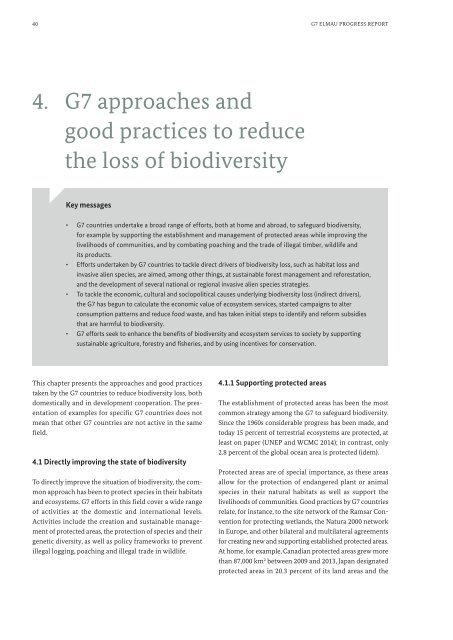G7-Elmau-Progress-Report-2015-Biodiversity-A-vital-foundation-for-sustainable-development
G7-Elmau-Progress-Report-2015-Biodiversity-A-vital-foundation-for-sustainable-development
G7-Elmau-Progress-Report-2015-Biodiversity-A-vital-foundation-for-sustainable-development
You also want an ePaper? Increase the reach of your titles
YUMPU automatically turns print PDFs into web optimized ePapers that Google loves.
40 <strong>G7</strong> ELMAU PROGRESS REPORT4. <strong>G7</strong> approaches andgood practices to reducethe loss of biodiversityKey messages• <strong>G7</strong> countries undertake a broad range of ef<strong>for</strong>ts, both at home and abroad, to safeguard biodiversity,<strong>for</strong> example by supporting the establishment and management of protected areas while improving thelivelihoods of communities, and by combating poaching and the trade of illegal timber, wildlife andits products.• Ef<strong>for</strong>ts undertaken by <strong>G7</strong> countries to tackle direct drivers of biodiversity loss, such as habitat loss andinvasive alien species, are aimed, among other things, at <strong>sustainable</strong> <strong>for</strong>est management and re<strong>for</strong>estation,and the <strong>development</strong> of several national or regional invasive alien species strategies.• To tackle the economic, cultural and sociopolitical causes underlying biodiversity loss (indirect drivers),the <strong>G7</strong> has begun to calculate the economic value of ecosystem services, started campaigns to alterconsumption patterns and reduce food waste, and has taken initial steps to identify and re<strong>for</strong>m subsidiesthat are harmful to biodiversity.• <strong>G7</strong> ef<strong>for</strong>ts seek to enhance the benefits of biodiversity and ecosystem services to society by supporting<strong>sustainable</strong> agriculture, <strong>for</strong>estry and fisheries, and by using incentives <strong>for</strong> conservation.This chapter presents the approaches and good practicestaken by the <strong>G7</strong> countries to reduce biodiversity loss, bothdomestically and in <strong>development</strong> cooperation. The presentationof examples <strong>for</strong> specific <strong>G7</strong> countries does notmean that other <strong>G7</strong> countries are not active in the samefield.4.1 Directly improving the state of biodiversityTo directly improve the situation of biodiversity, the commonapproach has been to protect species in their habitatsand ecosystems. <strong>G7</strong> ef<strong>for</strong>ts in this field cover a wide rangeof activities at the domestic and international levels.Activities include the creation and <strong>sustainable</strong> managementof protected areas, the protection of species and theirgenetic diversity, as well as policy frameworks to preventillegal logging, poaching and illegal trade in wildlife.4.1.1 Supporting protected areasThe establishment of protected areas has been the mostcommon strategy among the <strong>G7</strong> to safeguard biodiversity.Since the 1960s considerable progress has been made, andtoday 15 percent of terrestrial ecosystems are protected, atleast on paper (UNEP and WCMC 2014); in contrast, only2.8 percent of the global ocean area is protected (idem).Protected areas are of special importance, as these areasallow <strong>for</strong> the protection of endangered plant or animalspecies in their natural habitats as well as support thelivelihoods of communities. Good practices by <strong>G7</strong> countriesrelate, <strong>for</strong> instance, to the site network of the Ramsar Convention<strong>for</strong> protecting wetlands, the Natura 2000 networkin Europe, and other bilateral and multilateral agreements<strong>for</strong> creating new and supporting established protected areas.At home, <strong>for</strong> example, Canadian protected areas grew morethan 87,000 km 2 between 2009 and 2013, Japan designatedprotected areas in 20.3 percent of its land areas and the


